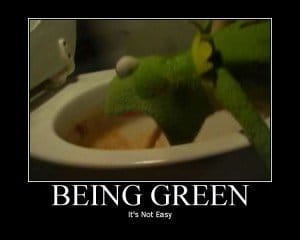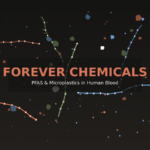Return on Investment
Paper vs. Plates is just one question in the bigger picture
Part 2 in a series on the conflicts between the environmental and the economical impulses in all of us, and how we resolve them. (repost)
“How to be green? Many people have asked us this important question. It’s really very simple and requires no expert knowledge or complex skills. Here’s the answer: Consume less. Share more. Enjoy life.” – Derek Wall
I was at a friend’s home recently when I noticed he had no paper napkins, towels or tissues, because, he said, he wanted to reduce impact on the planet. Meanwhile, his SubZero dishwasher was running full bore. Tug of War Economics or Ethics?
This perplexed me. I was sure he was taking a bigger whack out of the planet’s resources with that honking big dishwasher than I would have if I needed to blow my nose with a Kleenex or to use a paper plate to eat some leftovers.
Return on Investment
And it got me thinking: In our pious zeal to feel better about the mess we’re collectively making of the planet, many of us have settled on personal steps to green things up a bit. But are those steps really worthwhile, or just sops to make us feel less guilty? What’s the real return on investment of these options compared to some alternative?
At CGI Clinton Global Initiative, RampRate and I studied how data center emissions could be chopped 60%. And cost would tumble too. But that often isn’t enough to overcome the hurdles of corporate decisions. Green doesn’t always pay. The grass isn’t always greener on the other side of green.
We are trapped in a confusing, ever-changing sliding scale between what’s environmentally correct on one end and what’s financially and emotionally acceptable on the other. And where we fall on that scale in any one set of questions can vary wildly depending on what else is going on in our lives, and what’s being asked of us. My friend Taylor Milsal, one of Silicon Valleys insiders extraordinaire – forever TEDster, bikes everywhere, no car for years and helps grow businesses from fuel cells to Uptime Institute to simply living the legend. If lucky, you get to attend one of her exclusive amazing soirees.
“We won’t have a society if we destroy the environment.” – Margaret Mead
The results have led us into some messy and annoying compromises, or left us to look for easy, lazy solutions to complex questions. Take the question of paper versus permanent at my friend’s place.
Long time buddy Richard Titus, co-producer of Who Killed the Electric Car proclaims “Sustainability is not about asceticism, it does not require one to forgo life’s pleasures – instead it is about developing and living a lifestyle, which can endure, conceivably forever. The Opposite of sustainability is not consumerism, it’s Nihilism.” and asserts “Sustainability is about moving the point of consumption to align with one of oversupply. Tesla, which converts excess evening electricity into scarce daytime automotive fuel is an excellent example of this.”
Fired by my paper pique, I went looking for self-important but ineffectual green “solutions.“ I was sure, for instance, that paper towels or plates don’t create any more planetary problems than using all that water and energy on the dishwasher.
But nailing down the true cost/benefit on these “eco-pieties” proved a challenge, starting with the dishes vs. paper debate. Web research turned up highly ranked, and highly useless, sites like this one, where readers are asked what they thought was likely to be the best approach. No one bothered to actually figure it out, they just asked for opinions. Mush-headed stuff like this drives me crazy.
Definitive answers can be difficult to nail down, though. There are too many variables, and you really have to think hard about your situation, something not enough people like to do. They just want an easy dictum they can follow. But life is seldom so straightforward.
In this case, let’s look at some basic questions. Are you washing those dishes by hand? If so, dishwasher is actually a lot more efficient, especially a new one, which can cut 37 percent from your water bill, the California Energy Commission says.
Here’s why: As of last year, Energy Star-qualified dishwashers must use less than 5.8 gallons to clean a full load (you do run the dishwasher only when it’s full, right? That’s another important question). Hand washing a similar number of dishes would typically use 20 gallons.
Other factors make a big difference too. Do you pre-rinse dishes headed for the dishwasher? The new Energy Star-compliant devices supposedly don’t require pre-rinsing. That can cut water use even more, but lots of people probably rinse (rather than scrape) before putting that dish in the machine.
“Ecology is rather like sex – every new generation likes to think they were the first to discover it.” – Michael Allaby
More tricks, even for older machines: Use the water-saver settings, if any, and save energy by opening the dishwasher before that last dry cycle. Do you do either?
There are other complications, too. Did the water come from some nearby, plentiful source, as is so common on the East Coast? Or, as most of it does in drought-vulnerable Los Angeles, through a few hundred miles of California Aqueduct, with all the environmental and energy issues surrounding that process?
Once the water got to your place, did an efficient on-demand water heater get that water hot, or was it an old-fashioned 40-gallon tank? And for that matter, where did the energy come from to do all the heating? Coal? Hydroelectric? Natural Gas?
On the flip side, are those paper plates made from trees that were cut down and trucked to a Georgia paper mill, where they were shredded, bleached and pressed into something you could use, once it was shipped thousands of miles to a store near you, and you drove over to pick it up?
Were those products made from recycled, previously shredded and bleached dead trees or from new ones? Weyerhaeuser, the big paper producer, says recycled paper uses 64 percent less energy and generates 74 percent less air pollution than the virgin stuff.
“It’s a morbid observation, but if everyone on earth just stopped breathing for an hour, the greenhouse effect would no longer be a problem.” – Jerry Adler
And for those worried about landfills topping out (a big concern in Los Angeles), there are new paper substitutes – made from sugar cane, potatoes, bamboo or corn – that break down more quickly when thrown away. Do you use the plate multiple times before tossing it? Will the plate be recycled again, or just dumped in that overstuffed landfill? How much water and energy did all that take?
Further confusing matters are smarmy vermin such as Richard Berman, who makes flesh the smiling devil of a protagonist from the brilliant satire “Thank You for Smoking.”
Like that oily character, Berman is a high-level Washington lobbyist for what I’ll call the “sin industries” – alcohol, tobacco, and the more problematic corners of the food business. His job is to make people think that maybe it’s okay to consume those things scientists say we really shouldn’t.
Berman runs innocuous-sounding “grassroots” organizations such as The Center for Consumer Freedom, whose pronouncements cloud any science-based public health discussions (really, a Big Mac has just a few more grams of saturated fat in it than, say, a mango (which has, uh, virtually none)).
If you have a hard time figuring out many eco issues, it may be you need to thank, or blame, Berman and his ilk for a job well done.
“We abuse land because we regard it as a commodity belonging to us. When we see land as a community to which we belong, we my begin to use it with love and respect.” – Aldo Leopold
So where do I come down on the paper versus dishwashing debate? A British government study looked at the related debate over cloth diapers versus disposable ones. They found it a, uh, wash.
I’m guessing you could similarly make a case for either side in the paper vs. dishwashing argument, depending on the variables. Me, I’m still leaning toward paper in the short term, depending on whether water or landfill space is scarce near you, and what you do with the plate. I can turn off the water, but a boycott of paper plates seems a mountain too high to climb. Today.
To help us figure this out, I asked my colleagues at RampRate to build a little calculator to do the math for this conversation. This and other tools will be posted over the coming weeks. They do this sort of thing all the time for our clients, but in a very different space, figuring out the best prices for services like cloud computing, data centers, telecom and outsourcing. Trade offs between strategic and price conscious, price or performance and power versus availability are current Tugs of War that we live with daily. But it’s the same process at heart: figuring out what matters to you, and then connecting to the solution that works best for your particular sliding scale between emotion, economy and environment.
It’s a useful exercise in thinking through this particular eco-piety, and the ways it is affected by the many choices we make. That’s the kind of conscious living we need more of, so we aren’t blindly following anyone’s lead on matters that matter.
“Green, how I want you green. Green wind. Green branches.”– Federico Garcia Lorca
What do you think? Are there any ways, big or little, that you’re trying to live a more green existence? Do they really pencil out? Have you heard of some that don’t? Let me know and I’ll put them through a calculator to see what’s right.













It may not always pay of short term to go green. Long term it always does.